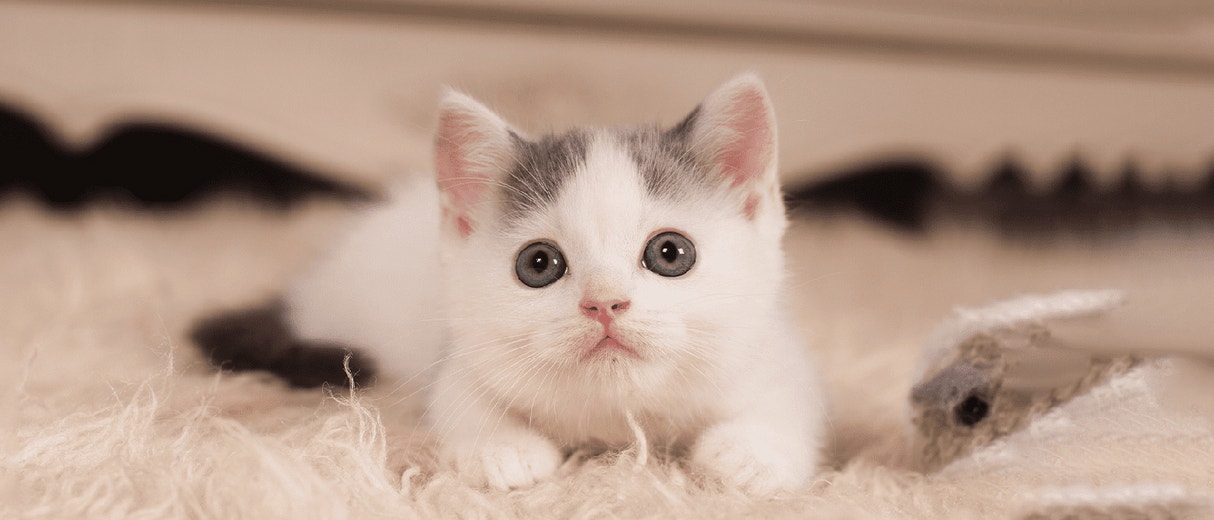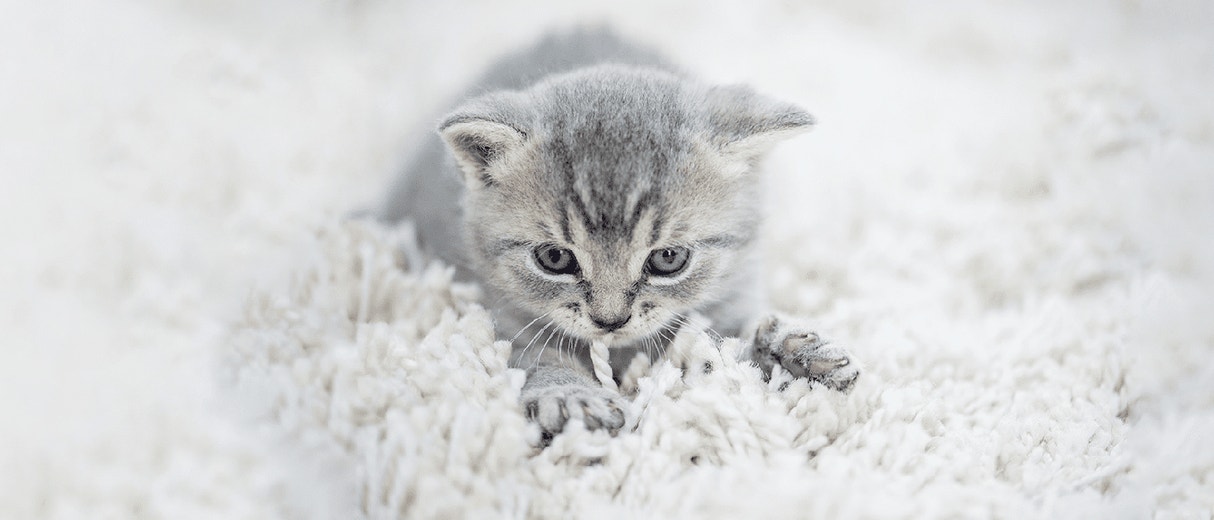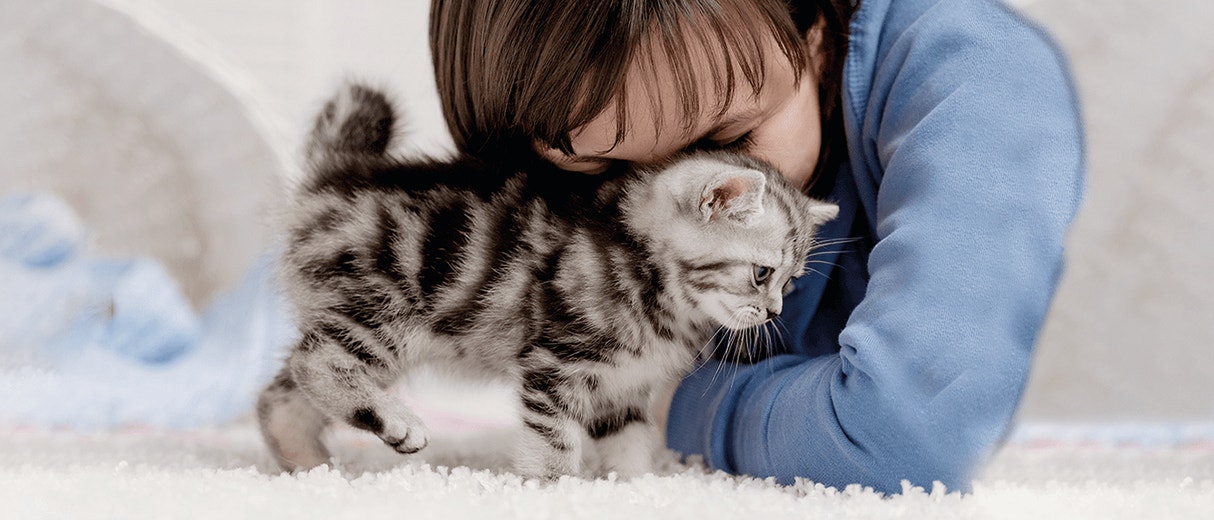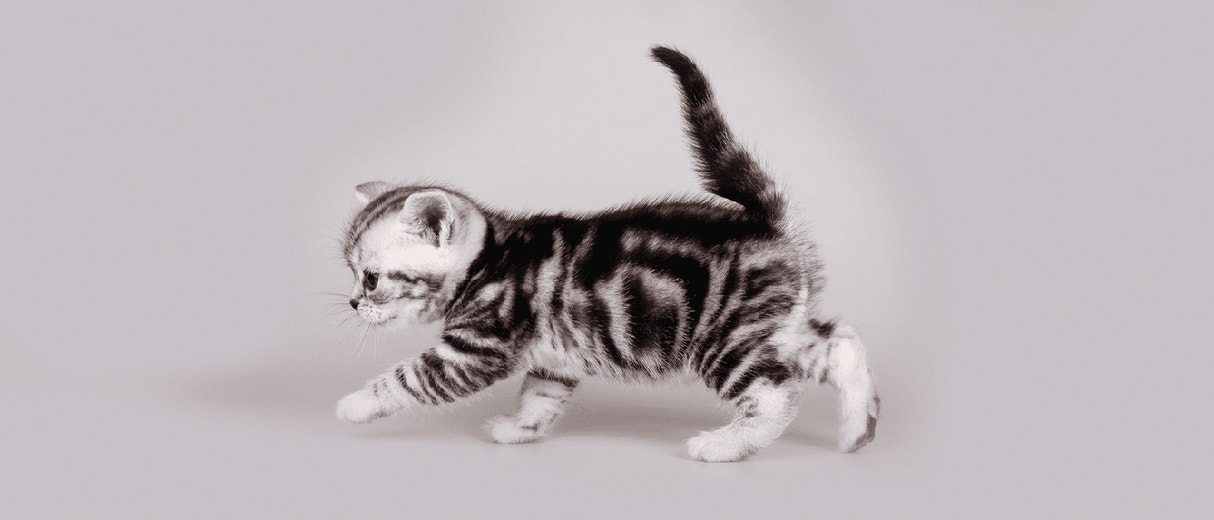
Kitten Sounds And Their Meaning
From the classic “meow” to a wide range of purrs and yowls, your little kitten uses her natural voice to make a huge variety of sounds - more than most other animals, in fact.
How do Kittens express themselves through sounds?
Have you ever wondered what does kitten meowing mean? Unlike dogs, cats usually lack the ability to express themselves through varied expressions. By nature, cats are usually quieter, making their behaviours quite challenging to interpret.
Cats and kittens are extremely vocal creatures, meaning they prefer communicating themselves through sounds, usually through variations in tone and vocalizations. If you have been a cat parent for a long time, you are likely to develop some understanding of what your little furball is trying to say through its sounds.
So, by paying close attention to the subtle changes in the kitten sounds they make, you can interpret your kitten better than ever, and grow a deeper bond with your furry munchkin.
Types of sounds a kitten can make
Kittens usually are able to express themselves through variations in their tone and vocalization. Of these, the following are the most common types of sounds a kitten can make:
Long meow
Did you know that cats meow mostly as a form of communication with humans? A long, drawn-out kitten meowing usually is understood as a call for attention. Your furry friend is excited, and they want you to share the experience with you. It can also indicate that your little munchkin needs something, like food. High-pitched meows can however be interpreted as a sign of being upset.
Short meow
A short meow is probably the most common sound made by kittens, and is mostly a sign of greeting, or your kitten’s way of saying hello! Short kitten meowing might not always mean anything in particular, but that your feline friend is glad to see you, and wants some well-deserved cuddles and strokes. Kitten meowing sounds are generally signs that your kitten is secure and happy.
Chirrup
Cats, especially mother cats often use chirping sounds and trills as a gesture toward their kittens for following them. If your kitten is mimicking the chirping sound around you, it can actually mean that your kitten wants you to follow it. Adult cats too use chirrups to indicate they want to be followed, usually to their food bowl. Chirping kitten sounds are pretty common in cats as a way of conversing with each other.
Purr
What does kitten purring mean? Cats and kitten purring is usually out of delight and contentment. Kitten purring is common, and it usually indicates a happy mood, or while enjoying a meal. However, kittens often purr to calm or comfort themselves during sickness, anxiety or distress, so keeping an eye out for whether your kitten is showing signs of anxiety can help you understand any underlying issue they might be facing.
Yowl
A yowl caused by a kitten can sound like loud, drawn-out meows, but is usually suggestive of your kitten being in considerable distress. Kittens often yowl when they are stuck somewhere and need your help urgently, or they are experiencing physical distress which might require professional attention. As the cat grows older, a yowl can however be considered as a part of its mating behaviour.
Crying
A kitten crying usually indicates that it is looking for something, or calling out to its mother or other kittens. However, a kitten crying for longer periods can also mean underlying health concerns that are putting your furry friend in significant distress. Paying close attention to your kitten's crying can help you identify major health problems and make sure it gets the appropriate medical attention in time.
In addition to these kitten sounds, a kitten can produce other sounds, such as growling and hissing, which might mean your little munchkin is upset and wants to be left alone.
How to calm a crying kitten?
If kittens crying for long periods ca be heard, it can mean it is experiencing significant distress, or is upset, and needs to be comforted and calmed down. You can calm your kittens crying with the following easy steps:
- You can try holding your kitten. Kittens usually feel secure and comforted when held and stroked. Stroking is immensely beneficial as it simulates the feeling of a mother cat grooming her kitten, and helping it to socialize. You can use both hands to gently pick up and hold your little furball. You can also allow it to snuggle into your arms, as it generates a sense of security which can be helpful in calming a crying kitten.
- Stroking a crying kitten gently can help it calm down and stop crying eventually. You can stroke them gently on their head, back, and under their chin. Stroking also helps you to foster a deeper bond with your kitten. Talking to it gently, and in a calm, soft voice can also be helpful in distracting it. In addition, giving them their favourite treats or toys can also prove effective in calming a crying kitten.
How to communicate with your kitten?
Kittens are social creatures that can easily develop a bond with their favourite human through active communication. You can communicate with your kitten by closely observing its body language.
Kittens can express a lot through nonverbal modes of communication, such as the movement of their tail and ears. Looking into your kitten’s eyes can also be a great way of interacting with them - slow blinking, long gazes, and dilated pupils are signs that your cat is trusting of you and is affectionate towards you. Other forms of nonverbal communication can include your kitten rubbing against you, touching you with its wet nose, playfully head-butting you, kneading or grooming you. You can also communicate with your kitten by speaking in a gentle, calm tone.
In addition, nonverbal communication can go a long way in interacting with your kitten. Some of the common ways of nonverbally communicating with your kitten can include:
- Looking into your kitten’s eyes and slow blinks.
- Gentle hand gestures such as pats. You can also invite your cat to join you for a cuddle by gently patting a space next to you.
- Avoid yelling at your kitten.
Do you need to call the vet?
Regular appointments with your veterinarian are important for making sure your kitten is free from the risks of any underlying health concerns. Though kitten’s crying might not always mean they require medical attention, understanding the symptoms will help you to identify urgencies. You can look for the following signs to make sure whether you need to call the vet:
- Look for signs that indicate obvious distress. Howling, crying, and hiding for long periods can indicate significant distress which needs to be checked out. You can also observe closely for behaviours that seem out of character for your kitten.
- Check your kitten’s litter box to make sure it doesn’t require immediate attention from a professional. Urinating outside the litter box and diarrhoea can imply health concerns which might require treatment.
- You should look out for other symptoms that can help you identify whether your kitten needs a visit from the veterinarian. Excessive vomiting, fatigue, and changes in appetite and breathing can require healthcare professionals.
Kitten sounds FAQs
-
Why does my cat knead blankets?
Wondering why do cats knead blankets? They knead blanket as a habit from their kittenhood when they kneaded their mother’s belly while nursing. It is a sign of contentment and relaxation. They also do it for nesting, i.e., preparing a place to sleep in just like humans fluff up their pillows.
What is Cat making biscuits?
Cat making biscuits is when cats ‘knead’ on soft objects like a blanket or on their human’s lap to show contentment, love and affection. They push one paw after another rhythmically, which resembles kneading dough and hence the behaviour is known as cat making biscuits.
Is cat kneading a sign of affection?
While it might not be the most comfortable way for you but your cat is showing you love and affection by kneading on you. Also known as cat making biscuits since they way it resembles kneading dough, cats knead only when they are content and relaxed.
What do cat tail flicks mean?
To know the language of the cat from the tail, observe the frequency of the flick or the cat tail positions. A rigid back and forth means the cat is focusing on something, most likely on prey. Flicking and thumping the tail indicates a high level of stress and agitation. An upright tail means your fur baby is asking for some love.
Why does my cat hit me with her tail?
Sometimes it is difficult to know the language of the tailed cat. It can be a gesture of fondness, or excitement. It can also mean slight frustration. But mostly it is a positive sign.
Why does my cat's tail move when I pet her?
If you are petting your cat, and in return, they move their tail slightly, it means they are feeling secure. Your cat feels safe in your presence, and if you wish, you may continue with your petting. In this way, you will know the cat language through the tail.
Do cats wag their tails like dogs when they are happy?
Dogs generally wag their tails when they are happy, satisfied, or excited. However, for cats, the same does not apply. The trick to knowing is a thorough observation of its movement. The cat can thump its tail, swish it, etc., and each has a different message.
What stresses out a cat?
Some of the most common causes of stress in cats are:
Change in routines
Home relocation
New member in the family
Loud noises
Vet visits
Getting bullied by other animalsDo cats purr when they are stressed?
Indeed, they do, since purring is not just a way of communicating contentment, affection, and happiness, but it is also a self-soothing technique. So yes, a stressed kitten might also purr.
Does petting a cat relieve stress?
While petting a cat will relieve your stress, the same cannot be said for your furry baby. Of course, if your fur kid wants to curl up to you when stressed, give her all the cuddles, but usually, a stressed cat would like to be left alone and hide in a safe place when stressed.
What can I give my cat to reduce stress?
You can use stress relief products such as calming collars, pheromone diffusers, and thundershirts to calm your fur baby. Or you can also offer calming cat food and treats and use play as a distraction. If nothing works and the signs of stress in cats continues for long, take your furry to see a vet.
Why does my cat rub against my legs when I walk?
If you are wondering why do cats rub against your legs, this article aims at explaining this behaviour. It is common for cats to rub against the legs of loved ones. Though it mostly signifies love and affection, it is a complex social interaction for cats. By rubbing against the legs of their favourite humans, cats leave scent signals to claim possession and belongingness, as well as for greetings and identification. Therefore, the next time you wonder why the cat rubbing head on me, remember to shower it with all the love and affection.
Can cats be trained not to scratch furniture?
Cat clawing is one of the natural urges in cats, which not just helps in marking territory or sharpening claws, but for relieves stress and feeling good. If trained from a young age, cats can get accustomed to not scratching furniture.
Why is my cat scratching the furniture?
One of the primary reasons behind a cat scratching the furniture is to maintain and sharpen their claws. However, in addition, cats scratch furniture to condition paw muscles, relieve stress, stretch, as well as to mark territories and leave scent signals. Scent signals, combined with claw husks and scratches are strong visual cues for other cats.
How can I get my cat to stop scratching the couch?
If you want to avoid your cat clawing the couch, you can purchase a scratching post for them to use instead. Using a citrus spray is also effective as a cat repellent to keep them off furniture. In addition, you can also trim their claws to make sure they stop scratching couches. However, if your cat ventures outdoors, it is better to use homemade cat repellent sprays than to have them declawed.
Why is my kitten meowing at night?
Most cats are nocturnal in nature, meaning they are more active at night. Though most domestic cats grow acquainted with the timing followed by their owners, some cats show natural tendencies of being more active during the night. Kitten meowing is a common practice for cats of all ages. However, if your kitten meowing is particularly at night, it might mean your little furball is feeling bored, and wants to go out. Similarly, if your kitten keeps meowing at night, it might be distressed for some reason.
Why do kittens chirrup?
Chirrups, or chirping sounds are commonly made by cats and kittens alike. Mother cats often use chirping sounds or trills to gesture their kittens to follow her. By imitating the chirping kitten sound, your kitten might want you to accompany or follow it.
Why is my kitten making weird noises?
If your kitten keeps meowing or making weird kitten sounds like yowls for longer periods of time, it is usually indicative that your kitten is upset with something, or is experiencing distress and anxiety. You can help your kitten to calm down by gently holding it, stroking its head and under the chin, as well as by providing it with its favourite treats and toys.
What do different kitten noises mean?
Kittens are social creatures which often use kitten sounds to interact with other cats, as well as their owners. Depending on the type of sound produced, its vocalization and tone, kittens can mean several things. Paying close attention to these noises can help you understand your kitten better and interpret what it is trying to communicate.
See More Articles Like This




